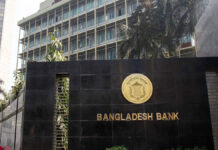The Metropolitan Chamber of Commerce and Industry (MCCI) has identified three major challenges to the economy as rising inflation, keeping the macro-economy stable and meeting export and revenue target steady.
The major chamber body in its quarterly economic update for April-June period also suggested remedial measures calling for making sure political stability to keep export and revenue collection unaffected.
Moreover, the government must improve law and order to give business a relative peace and restore momentum in economic activities. The report released last week said the overall economic condition was positive in the country as indicated by steady improvements in the major economic indicators.
To keep it going, political stability and improving law and order will be the other major challenges for the government. The achieving of the 7.3 percent growth target will largely depend on peace and stability and a momentum in economic activities, it said.
The MCCI said political stability should be maintained at all cost to achieve the government’s growth target and keep and inflation down. Then adequate infrastructure, energy, skilled manpower and investment-friendly climate are keys to achieving higher growth.
The chamber body said point-to-point inflation fell by 1.08 percentage points to 6.97 per cent in June this year, from 8.05 per cent in the same month last year.
The fall in inflation rate can be attributed to a massive decline in the non-food inflation, which fell by 2.3 percentage points to 5.45 percent in June 2014, from 7.75 percent in June 2013, it said.
It said growth prospects of the economy are poised to face serious challenge from political uncertainty. “Entrepreneurs, whether local or foreign, are not encouraged to make any new investment in the present political environment.
Foreign direct investment fell by $158 million in the first eleven months of last fiscal year, compared to the same period of the previous year, it said.
The chamber body said the investors are yet to get back confidence from the fear of further political turmoil.
Prospective foreign investors have adopted a ‘go-slow’ strategy in making fresh investments decisions since 2013, it said. “While public investment has increased, it cannot be an alternative to private investment, which is crucial to accelerating economic growth,” the MCCI opined.
The damages inflicted by political unrest last year to the national economy also dented the confidence level of the intending investors causing a slower growth in investment in the private sector.
Analysing the last fiscal year’s economic situation, the MCCI said the economy experienced stable growth, inflation was under control, the exchange rate remained stable and foreign exchange reserves rose and remained at a comfortable level.
The international rating agencies have given stable ratings to Bangladesh as they have done for a number of years now.
However, the performance of the manufacturing sector needs to be improved by removing bottlenecks in physical infrastructure and the crisis in power and energy supplies, the chamber said.
It said services sectors are doing well but need government support to be able to recover the losses they suffered during the political crisis last year.
Violence caused by political unrest hurts economic activities thus hindering growth, and disrupts the supply chain of goods which pushes up inflation, that fear must be removed.
The MCCI also made projections on some selected economic indicators for the first quarter of the current fiscal year.
It is assumed that relatively political calm will continue in the first quarter of the present fiscal year to result in a rise in export, import, and remittances. But the foreign exchange reserve is may fall in July to September due to payment to the Asian Clearing Union against imports.
The agriculture sector recorded 2.46 per cent growth in last fiscal year against 1.47 per cent growth in the previous year,, but it needs continuous government support with subsidized inputs and cash financing to sustain the sectoral growth.
The stock market came out of bearish trends caused by bouts of pre-election violence with the average daily turnover increasing in 2013-14.
Remittance inflows recorded a decline for the first time in 13 consecutive years in last fiscal year.
Source: Weekly Holiday










